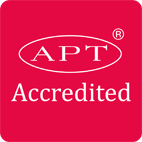|
Home ❯ Courses ❯ Dialectical Behavior Therapy ❯ DBT Essentials DBT Essentials (Dialectical Behavior Therapy training).DBT Essentials is a 3-day course from the Association for Psychological Therapies (APT), a leading provider of Dialectical Behavior Therapy (DBT) training courses. It is the only training that has automatic APT-accreditation and access to APT's post-course resources. It gives you a thorough introduction to DBT, it is APT-accredited, and has access to important resources for you to use post-course. It can be your first step to establishing a full DBT service, or for you to use as an individual professional. The course is available for teams and individuals and can be attended face-to-face or online. It can also be completed as part of The APT Diploma in Psychological Therapies and the Extended Training in DBT course. Put at its simplest, DBT hinges on teaching important life and psychological skills to those who need them, and then supporting them in applying those skills in real life. Both elements can sometimes be challenging and DBT has developed to overcome those challenges. DBT Essentials covers the delivery of effective DBT at its most relevant, including: impulsivity, lack of emotional control, interpersonal problems, high risk behaviors, including suicidal behavior and non-suicidal self-injury.
People who attend our DBT training normally fall into one of two categories: 1. Professionals who see patients in 1:1 treatment settings, have a significant degree of clinical skill, and wish to add DBT techniques to their repertoire. 2. 'Whole teams' (either in inpatient or community settings) seeking to develop a common approach to DBT and a full DBT Service. The professional affiliations of people attending our DBT training include: mental health/psychiatric nurses, social workers, occupational therapists, clinical psychologists, psychiatrists, and others. OVERARCHING THEORY AND KNOWLEDGE. The 4 'modes' (key components) of DBT. Skills development groups, where patients learn important life skills. 1:1 sessions where patients meet with their individual therapist to problem solve, maintain motivation, and more. Telephone support, where therapist and patient have telephone communication to help them apply the new skills they learn even in crisis situations. Consultation Meetings. Where all the professionals involved in providing DBT get together to discuss any current issues, to support each other and ensure quality control. What to do if you are providing DBT single handed and cannot provide all the components as listed above. Linehan's Biosocial model. What it is. Why it is important. How we operationalise it in therapy. Higher order skills of DBT. How to order competing priorities: deciding which of several problems to tackle first. Life-threatening behaviors, therapy-threatening behaviors, and behaviors that interfere with the quality of life. The patient-therapist agreement - our role in it. Assumptions we can make about the patient - and those we can't. THERAPIST KNOWLEDGE & SKILLS MAINLY USED IN 1:1 SESSIONS: Validation. Definition of validation, and why it is important. How validation links to Linehan's Biosocial model. The implication of invalidating environments for a child, and later for the adult. Different ways of validating. Metaphors. How metaphors work and why we should use them. 6 Examples of metaphors. 4 Metaphors you can use repeatedly, for common problem situations. General principles of metaphors, including visual metaphors. Relentless problem solving. Problem solving attitude and problem solving strategy, the usefulness of both. The five stage problem solving strategy. Forms for clients (and you) to use with problem solving. Problem solving exercise. Contingency management. Differential reinforcement in a clinical setting. The nature of contingency management and how it interacts with the conscious or unconscious motivations of the client. Behavioral analysis, especially as a response to severe behavior such as parasuicidal behavior. Chain analysis and solution analysis. AN EXTENDED OVERVIEW OF THE SKILLS TAUGHT TO CLIENTS IN GROUPS Emotion-regulation. The skills necessary to effectively regulate your emotions. Biological elements such as: sleep, exercise, illnesses, circadian rhythm. Specific multi-point strategies and the acronyms to remember them. Interpersonal effectiveness. Frequent interpersonal issues, and strategies to respond to them. Avoiding quarrels and maintaining relationships. Appropriate assertiveness and strategies for expressing it. Core Mindfulness skills. A definition and description of mindfulness and the best purposes it can fulfil. Mindfulness and its role in balancing 'the emotional mind' with 'the reasonable mind' to achieve 'the wise mind'. The skills of mindfulness. Distress tolerance. 'Distraction behaviors' that may be used to counteract and neutralize distress. 'Beyond distraction': steering the thought processes. 'Radical' distress tolerance: doing nothing. How to do nothing: the fact of this turning out to be an effective approach for many people, and the theory behind it. Walking the Middle Path What this means, why it is important. An overview of some of the exercises involved. You will have the feeling of knowing what DBT is all about, understanding it, and how it applies to helping people. Given that this is a post-qualification course so you already have the standard clinical skills, you will know enough about DBT from this course to start applying it in your practice. You will be able to work to develop your own skill in DBT and towards establishing a full DBT service if you wish, working with suitable colleagues. You will be able to create validating environments - environments that make people feel good. You will be able to quickly have people 'see things differently'. You will be able to (help people to) solve problems. You will be able to respond to people who have just done severe behaviors in a way which is caring yet does not reinforce the severe behavior. You will be able to (help people to) bring some sense of order and predictability to their emotions. You will have the chance to begin practising mindfulness. You will be able to (help others to) tolerate distress much better. Not to allow distress to get into a 'vicious spiral'. You will be able to order competing priorities amongst several 'top priorities'. All delegates are registered at APT as having attended the course, and receive a certificate to acknowledge their attendance, registration, and APT-Accreditation at the appropriate level. As a bona fide APT event, this course automatically has accreditation from The Association for Psychological Therapies. This accreditation is given weight by the fact of over 150,000 professionals having attended APT training. Upon completion of the 3-day course, you receive Level 1 APT Accreditation in DBT. You are also entitled to sit an online exam to uprate your APT-accreditation in DBT to Level 2. choose your favourite option: Option 1: Online Anytime course: A highly engaging pre-recorded course you can start any time you like – right now if you want. Price: $440 CAD per person. The fee covers: 3 years access to the course, certification, registration, and Level 2 APT Accreditation by completing the course and inbuilt exam. Guarantee If you don’t complete the course for some reason, then you can simply ask for your money back! If you are a manager ordering multiple courses, and some of your team don’t complete them, you can ask us to transfer those courses to others in your team! (Valid for up to 3 years from the date the training was assigned.) Buy Now (access immediately) Request Invoice (access when paid) Option 2: Online Live course: A live and interactive event hosted online via Zoom (and you don’t even have to have your own Zoom account). Price: $795 CAD per person. The fee covers: tuition, PDF workbook, certification, registration, and accreditation at APT’s Level 1, with option to sit the online exam (free-of-charge and in your own time) to upgrade to Level 2. Available dates (courses run from 10am-4pm Eastern Time, unless otherwise stated): 6-8 October 2025 Book Now Option 3: Exclusive course for your organization: We can deliver the course ‘online live’ (via Zoom or Teams) exclusively to you and your organization, for a group of up to 15 people. Price: $7,990 CAD, extra delegates: $525 CAD per person. Or, if you or a colleague are a senior mental health professional, you can apply to become an APT Tutor and, if your application is accepted, deliver the training in-house at half the standard cost (either face-to-face or live online). To book, email office@aptcanada.com, or click the button: Book Now
As a bona fide APT event, this course automatically has accreditation from The Association for Psychological Therapies. This means (i) that it contains the right amount of relevant information for its duration, and (ii) the information is presented in an engaging way, and in a way that will make it likely to be used after the course. APT verifies the accreditation by publishing the delegates' average ratings of relevance and presentation-quality for all its accredited courses. The accreditation is given value by over 150,000 professionals having attended APT courses. (责任编辑:) |


